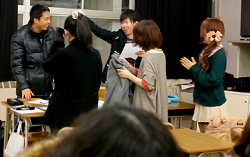Faculty as a situational leader
As classroom leaders, adult educators might consider taking a contingency approach to meeting a student body's dynamic needs with broadening functional diversity. The more experienced, capable, and motivated the learner, the more faculty can apply andragogical teaching methods, like facilitation. The less experienced, capable, and motivated the student, the more faculty can use pedagogical teaching methods, like lecture-test. As with the situational leadership model, faculty can develop dependent learners to help them become self-directed learners who can thrive as members of a collaborative learning community.
Adapting teaching style to accommodate individual learners' needs goes beyond finding the right balance on Knowles' [2] continuum between andragogy and pedagogy. It involves developing a "multi-gogical" or integrative style that allows faculty to develop the individual student toward self-direction by integrating teaching techniques that meet all students' dynamic developmental needs in a class [3]. This contingency approach to student development requires faculty to accurately assess each student's developmental needs, deliver the right mix of teaching styles that meet the class's needs, and actively engage as fellow learners.




